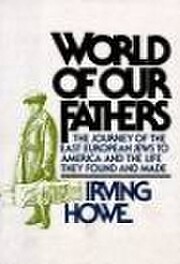

Click on a thumbnail to go to Google Books.
|
Loading... World of Our Fathers (Touchstone Book) (original 1976; edition 1976)by Irving Howe (Author), Kenneth Libo (Collaborator)
Work InformationWorld of Our Fathers by Irving Howe (1976)
 No current Talk conversations about this book.   ) )Now that Bernie Sanders, a self-declared democratic socialist (the kiss of death, alas, in American politics) has declared his candidacy for president, perhaps Irving Howe's World of Our Fathers will reenter the zeitgeist and receive the attention it so richly deserves, Senator Sanders, in many respects, is the latter-day representative of the social, political and cultural milieu Mr. Howe so thoroughly and affectionately documents in this fine book. When Eastern European Jews began departing their homelands in the late-nineteenth century, they carried with them the communitarian traditions of the shtetl. Unsurprisingly, these traditions were expressed in and as socialist politics. Much of the political--as well as social and cultural--ferment Eastern European Jews aroused occurred on the Lower East Side of Manhattan (which, after reading this book, I'll look at differently and appreciate even more). When the Williamsburg Bridge went up in 1903, connecting Delancey Street on the Lower East Side with Havemeyer Street in Brooklyn, many of these recently arrived immigrants moved across the East River to Williamsburg, where many of their descendants remain. Bernie Sanders, whose father's family perished in the Holocaust, was born in Brooklyn in 1941. He attended James Madison High School on Bedford Avenue, and there he led the track team. Irving Howe was a lifelong socialist; the documentary film "Arguing the World" is a very nice biography of Mr. Howe and his erstwhile classmates at the City College of New York (known at one time as "the Harvard of the proletariat"), Daniel Bell, Nathan Glazer and Irving Kristol. The film nicely documents the various intellectual trajectories these four sons of the Lower East Side traveled along. One of the primary themes of World of Our Fathers concerns the doctrinal squabbles among the Jewish socialists on the Lower East Side. Along the way, Mr. Howe presents detailed and fascinating analyses of Yiddish culture and its effect on broader American culture. He does a particularly nice job of explicating Yiddish humor, and its exponents like Henny Youngman, Don Rickles and Rodney Dangerfield, and the extent to which it influenced comedians of all stripes. I found myself wondering what Irving Howe would make of latter-day borscht belt comedians like Larry David and Jerry Seinfeld. This is an exceptional work of scholarship that it is imbued with Mr. Howe's (born, incidentally, as Irving Hohenstein) obvious affinity with and a fondness for the subject. For some reason, it took me 25 years too get around to reading this book. If the subject of the immigration of Eastern European Jews to the United States, and the influence of those new citizens on American culture and society interests you in any way, I very highly recommend this book--as well as what is arguably its companion, Our Crowd by Stephen Birmingham. Immensely detailed portrait of the New York East Side Jewish community, with lots of information about the adjustment and assimilation of the immigrant Jews into all aspects of the city's urban life and interesting information about the Yiddish culture. It's unfortunate (as the author acknowledges in his introduction) that despite the broad title, the book focuses so much on New York to the exclusion of other cities. The section on Yiddish culture also included a good deal of literary criticism, which would have been more meaningful if I'd already been familiar with the writers being discussed and then agree with or take issue with the author's judgments. Still worth a read for anyone interested in Jewish history as long as you keep these things in mind. I'm giving this book only two stars because even though the title includes the phrase "The Journey of the East European Jews to America" there appears to be nothing about any place other than New York, and possibly some other U.S. cities. A great many Jews emigrated to Canada (particularly Montreal), Mexico, Argentina, etc. All "America".The first section, describing conditions in Eastern Europe, motivations for emigrating, and the journeys through Europe and across the Atlantic, is great. That's only about 50 pages out of a 700 page book. AwardsDistinctionsNotable Lists
A new 30th Anniversary paperback edition of an award-winning classic. Winner of the National Book Award, 1976 World of Our Fathers traces the story of Eastern Europe's Jews to America over four decades. Beginning in the 1880s, it offers a rich portrayal of the East European Jewish experience in New York, and shows how the immigrant generation tried to maintain their Yiddish culture while becoming American. It is essential reading for those interested in understanding why these forebears to many of today's American Jews made the decision to leave their homelands, the challenges these new Jewish Americans faced, and how they experienced every aspect of immigrant life in the early part of the twentieth century. This invaluable contribution to Jewish literature and culture is now back in print in a new paperback edition, which includes a new foreword by noted author and literary critic Morris Dickstein. No library descriptions found. |
Current DiscussionsNonePopular covers
 Google Books — Loading... Google Books — Loading...GenresMelvil Decimal System (DDC)301.45Social sciences Social sciences, sociology & anthropology Sociology and anthropology Formerly: Social structureLC ClassificationRatingAverage: (4.05) (4.05)
Is this you?Become a LibraryThing Author. |
||||||||||||||||||||||||||||||||||||||||||||||||||||||||||||||||||||||||||||||||||||||||||||||||||||||||||||||||||||||||||||||||||||||||